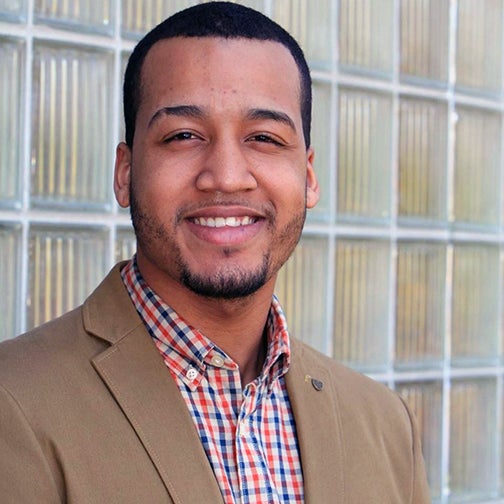KINGSTON, R.I., June 13, 2017—Six years ago, Alexander Jimenez was shining wingtips in the men’s shoe department at Nordstrom to make ends meet.
Now the University of Rhode Island student is brushing up on his Chinese as he prepares to study for a year at a university in Taiwan.
His journey from a tough and impoverished neighborhood in South Providence to the halls of academia on URI’s leafy Kingston campus is so unexpected he has a hard time processing it.
“I don’t really think about it,” he says. “Maybe I should. Maybe I should think about my accomplishments. I think so much about what I have to do, what I want to do, I forget what I’ve already done.”
His achievements are remarkable, he says, considering where he came from and what he had to face as he made the climb.
Growing up in Providence’s Broad Street neighborhood, Jimenez was one of seven children in a household that put little emphasis on education. His parents, both from the Dominican Republic, never finished middle school. His mother cleaned houses and hotels; his father managed small convenience stores.
As a teenager, Jimenez was expected to work to pay the rent. His first job was assembling jewelry at home. He was 14. His first paycheck was $30, which he handed over to his mom for gas. In high school, he bagged groceries and pushed carts at a supermarket.
If he wanted anything, he had to pay for it: a haircut, clothes, sneakers.
After barely graduating from high school, he enrolled at the Community College of Rhode Island because, he says, “he didn’t want to live in poverty” for the rest of his life. He buckled down, graduating in 2015 with a degree in liberal arts.
URI was his next stop, thanks to a generous financial aid package that is allowing him to graduate with only a small debt. He took advantage of all opportunities that came his way.
He made the dean’s list, participated in the University’s Honors Program, was inducted into Phi Beta Kappa and received the Estes Benson Award for Academic Achievement, which goes annually to a male and a female student with the highest grade point average among black seniors.
He was a teacher assistant for URI sociology lecturer Alana Bibeau and participated in two internships: one at a union for nursing assistants, security guards and housekeeping staff, the other at the State House as an intern for State Rep. Grace Diaz. While working as a field organizer on the gubernatorial campaign of Claiborne Pell, he came up with the idea of studying Chinese. Pell, who speaks Chinese, encouraged him to pursue the language.
Never one to turn down a challenge, Jimenez did. He watched Chinese language YouTube videos and taught himself how to say “hello” and “goodbye” in Chinese so he had some knowledge of the language when he transferred to URI. One summer, he lived on campus for a Chinese immersion program that required him to speak the language round-the-clock. “Now that was hard,” he says.
Next May, the 25-year-old will graduate with degrees in Chinese and sociology, a field that, he says, has helped him understand why he started his life in one of the poorest and roughest neighborhoods in Rhode Island. “I understand now, even though I don’t like it. At least I understand.”
He credits his URI professors with inspiring him to excel, in and out of the classroom.
Mastering the Chinese language is one of his goals. His year abroad at National Taiwan University was made possible by scholarships from the Freeman-ASIA Scholarship, the Taiwan Ministry of Education Huayu Enrichment Scholarship and the Beatrice S. Demers Foreign Language Fellows fund. Demers was a former URI professor who loved languages—just like Jimenez, who also speaks Spanish.
“It’s going to be very different over there,” he says. “I’m nervous and excited at the same time. That’s what big moves in your life do.”
This summer, he’s working as a live-in counselor for Talent Development, a highly regarded URI program that serves high school graduates from disadvantaged backgrounds.
“I can’t wait to help these students,” he says. “I know what being disadvantaged is. Sometimes that’s the only thing that keeps someone from achieving. Natural talent is never allowed to rise.”
After Taiwan, Jimenez might go to law school, get his master’s degree in business or earn his doctorate in sociology. His mind is spinning with possibilities.
“Once you get that spark, you can’t stop. You’re pro-active about what you can do. There’s a future. The more I learn, the more I know I have to become someone.”

